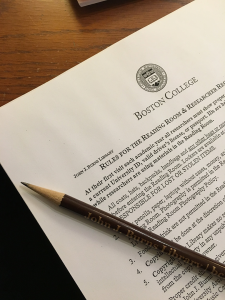
Burns Library is saying farewell to paper–paper forms, that is!
Researchers who visit John J. Burns Library and other special collections libraries are accustomed to filling out forms by hand to request rare books and archival materials they would like to use in the reading room. However, Summer 2018 will be the last time Burns Library researchers are given paper forms alongside the reference staff’s smiles and offers to help. Starting this fall, we will be launching a new Burns Library Account system through which students, faculty, and other researchers will register, request materials, and schedule reading room appointments online, and even on the go.
Sounds great! Tell me more about what I will be able to do from my account.
You will be able to curate your Burns Library research experience — on campus or off, at any time of the day or night — through the links that will be added to the BC Libraries’ online catalog that allow you to request items through your Burns Library Account. By providing a date for your research visit as you request items, Burns Library staff will have the materials ready and waiting for you when you arrive in our reading room. You will be able to schedule visits for the next day or as far in advance as you need, enabling you to build a series of lists for future research. The new system will also allow you access to a convenient record of your previous requests, making it easier to remember what you have worked with and when, export citations, and even request the same materials again. You will even be able to submit copy requests through your account.
I’m a faculty member. How will my Burns Library Account help with my teaching?
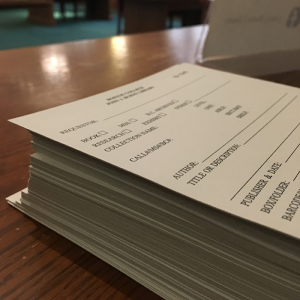
Your Burns Library Account will also facilitate selecting and reserving materials for Burns Library class visits and assignments. You will be able to work collaboratively with the Burns instruction staff to compile lists of materials most suited to your class needs, and review and update those lists when your class returns in future semesters. The Burns Library Account system can also facilitate course assignments using special collections materials. You will be able to provide a simple link to catalog records for the materials you’d like students to use. They will then be able to register, request the materials, and schedule their appointments in the reading room to complete their assignments.
Almost too good to be true. Are other libraries using this system?
You bet! Since its introduction in 2009, more than 60 institutions in the US, UK, and Australia have adopted Aeon — the software system that will power your Burns Library Account. Created and supported by Atlas Systems, Aeon is based on the architecture of ILLiad, the interlibrary loan request system that BC Libraries users are already familiar with. Some researchers may have already used Aeon at another library. In the Boston area, Houghton and many other special collections libraries at Harvard have implemented Aeon, as well as the Massachusetts Historical Society and Tufts University, and soon the Boston Athenaeum. Each institution maintains its own system for privacy reasons, so if you have an account elsewhere, you’ll need to create a new one for Burns Library.
I feel more confident now. Who’s to thank?
Thank your lucky stars and Golden Eagle Phil Mooney ‘66 and his wife, Kathy. Phil decided to direct his fiftieth reunion gift to advancing the use of technology in Burns Library. It was a natural choice. As director of archives for the Coca-Cola Company for more than 35 years, Phil dreamed up the idea for the original World of Coke museum in Atlanta and helped make it a reality. At Phil’s request, Coca-Cola kicked in a matching gift to help make our new account system a reality. So come to Burns Library for a rare book and a smile. It’s the real thing.
“The pause that refreshes” … I get it! When can I start?
The Burns Library Account system will be introduced on August 15, in time for the fall semester. As we get closer to our launch date (Assumption Day!), be on the lookout for more information on how to create and use your account.

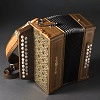
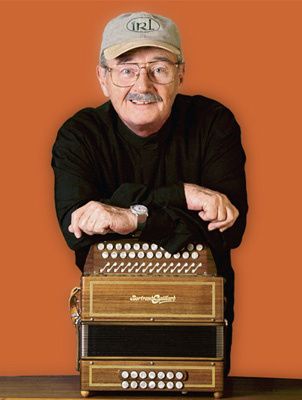





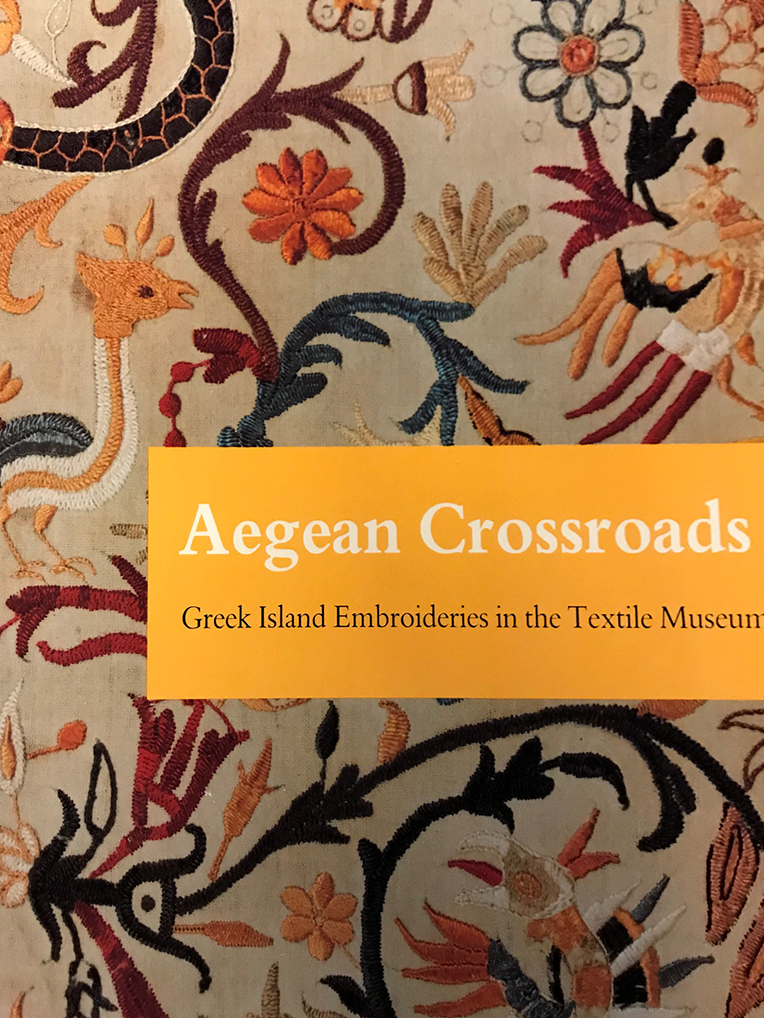


 From February through June, Burns Library presented The Object in the Archives: Networks and Materiality at Burns Library, an exhibit curated by Rachel A. Ernst, Ph.D. ’18, and longtime Burns Library Reading Room assistant. In her dissertation, “Mattering: Agentic Objects in Victorian Literature,” Dr. Ernst examined objects that have agency within the 19th-century novel and the ways in which those objects reshape their storyworlds. Shifting her lens to the holdings at Burns Library, she chose representative objects from 30 different collections and grouped her selections into four categories: personal, professional, sacred, and leisure. She then asked the visitor to consider how objects move from personal possession to archival artifact, and the relationships and connections that develop between and across objects, collections, and researchers. For a more in-depth look into her curatorial process, see the entry she contributed to our
From February through June, Burns Library presented The Object in the Archives: Networks and Materiality at Burns Library, an exhibit curated by Rachel A. Ernst, Ph.D. ’18, and longtime Burns Library Reading Room assistant. In her dissertation, “Mattering: Agentic Objects in Victorian Literature,” Dr. Ernst examined objects that have agency within the 19th-century novel and the ways in which those objects reshape their storyworlds. Shifting her lens to the holdings at Burns Library, she chose representative objects from 30 different collections and grouped her selections into four categories: personal, professional, sacred, and leisure. She then asked the visitor to consider how objects move from personal possession to archival artifact, and the relationships and connections that develop between and across objects, collections, and researchers. For a more in-depth look into her curatorial process, see the entry she contributed to our  Our Summer 2018 exhibit is Dreams of Art & Glory: Book Craft by the Roycrofters. Elbert Hubbard founded Roycroft Press as a private press in East Aurora, New York in 1894 when he was unable to find a publisher for his work Little Journeys to the Homes of the Great. The Roycrofters — a community of craftspeople and artists attracted to Hubbard’s philosophies — flourished within the widespread Arts and Crafts movement for several decades, before declining after Hubbard’s death in 1915. The exhibition features volumes from the Boston College Libraries that highlight Roycrofter printing and bookbinding designs, including the modest Little Journeys pamphlet series, beautifully printed and hand decorated texts, and stunning modelled leather bindings. Works from other artists and presses are also displayed, highlighting the worldwide influence of the Arts and Crafts movement.
Our Summer 2018 exhibit is Dreams of Art & Glory: Book Craft by the Roycrofters. Elbert Hubbard founded Roycroft Press as a private press in East Aurora, New York in 1894 when he was unable to find a publisher for his work Little Journeys to the Homes of the Great. The Roycrofters — a community of craftspeople and artists attracted to Hubbard’s philosophies — flourished within the widespread Arts and Crafts movement for several decades, before declining after Hubbard’s death in 1915. The exhibition features volumes from the Boston College Libraries that highlight Roycrofter printing and bookbinding designs, including the modest Little Journeys pamphlet series, beautifully printed and hand decorated texts, and stunning modelled leather bindings. Works from other artists and presses are also displayed, highlighting the worldwide influence of the Arts and Crafts movement. Also on display this summer, on the Bapst Library landing outside Gargan Hall, is Viewpoints: Reactions from the Boston College Community, a look at how students have responded to the current events of their days. Diaries, letters, photographs, and poetry from the Boston College Archives allow us to cultivate a connection through time by way of BC students who were serving in the military, confronting racial strife, or grappling with difficult choices.
Also on display this summer, on the Bapst Library landing outside Gargan Hall, is Viewpoints: Reactions from the Boston College Community, a look at how students have responded to the current events of their days. Diaries, letters, photographs, and poetry from the Boston College Archives allow us to cultivate a connection through time by way of BC students who were serving in the military, confronting racial strife, or grappling with difficult choices. For the Fall/Winter exhibit, Burns Library Archives staff are in the midst of surveying hundreds of linear feet of typescript and manuscript documents to uncover doodles, drawings, sketches, sculptures, and other artwork to demonstrate that there’s so much more to archives than just words.
For the Fall/Winter exhibit, Burns Library Archives staff are in the midst of surveying hundreds of linear feet of typescript and manuscript documents to uncover doodles, drawings, sketches, sculptures, and other artwork to demonstrate that there’s so much more to archives than just words.
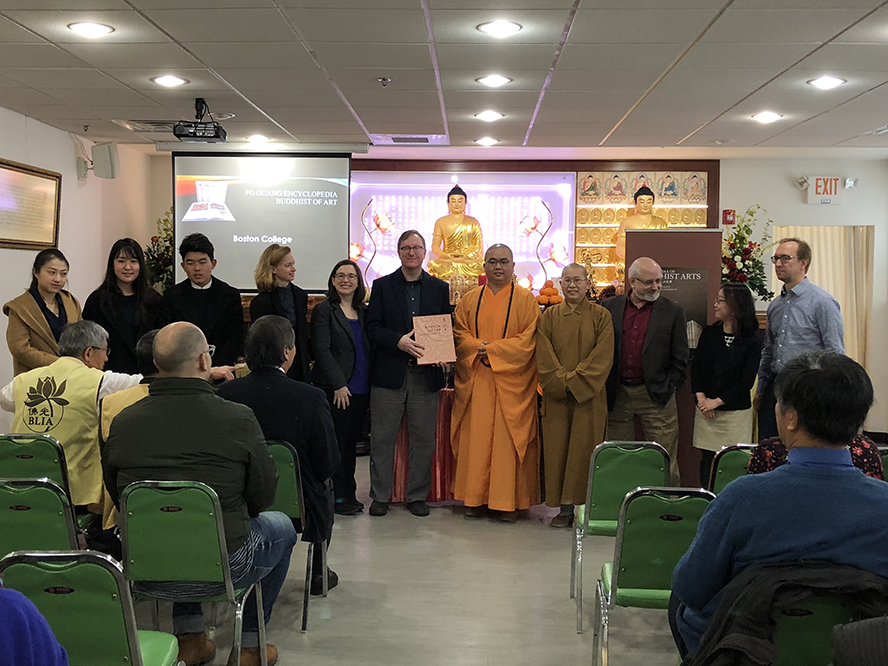 In January 2018, Fo Guang Shan Buddhist Temple in Cambridge donated a 22 volume English Language Encyclopedia of Buddhist Art to the Boston College Libraries. The Fo Guang Shan Temple congregation has 250 temples around the world and this encyclopedia represents the collective 12-years long effort of many monks and scholars. The encyclopedia has nearly 10, 000 entries, over 14, 000 pictures, and appears to be the first comprehensive reference collection of Buddhist art in the world. This gift was enthusiastically welcomed by Fine Arts, Theology, and Asian Studies faculty as a valuable and much needed addition to the Boston College Libraries’ collection on Buddhism. Chris Strauber, Julie Hughes, and Fine Arts faculty Aurelia Campbell accepted the gift on January 28th at the Fo Guang Shan Temple.
In January 2018, Fo Guang Shan Buddhist Temple in Cambridge donated a 22 volume English Language Encyclopedia of Buddhist Art to the Boston College Libraries. The Fo Guang Shan Temple congregation has 250 temples around the world and this encyclopedia represents the collective 12-years long effort of many monks and scholars. The encyclopedia has nearly 10, 000 entries, over 14, 000 pictures, and appears to be the first comprehensive reference collection of Buddhist art in the world. This gift was enthusiastically welcomed by Fine Arts, Theology, and Asian Studies faculty as a valuable and much needed addition to the Boston College Libraries’ collection on Buddhism. Chris Strauber, Julie Hughes, and Fine Arts faculty Aurelia Campbell accepted the gift on January 28th at the Fo Guang Shan Temple.